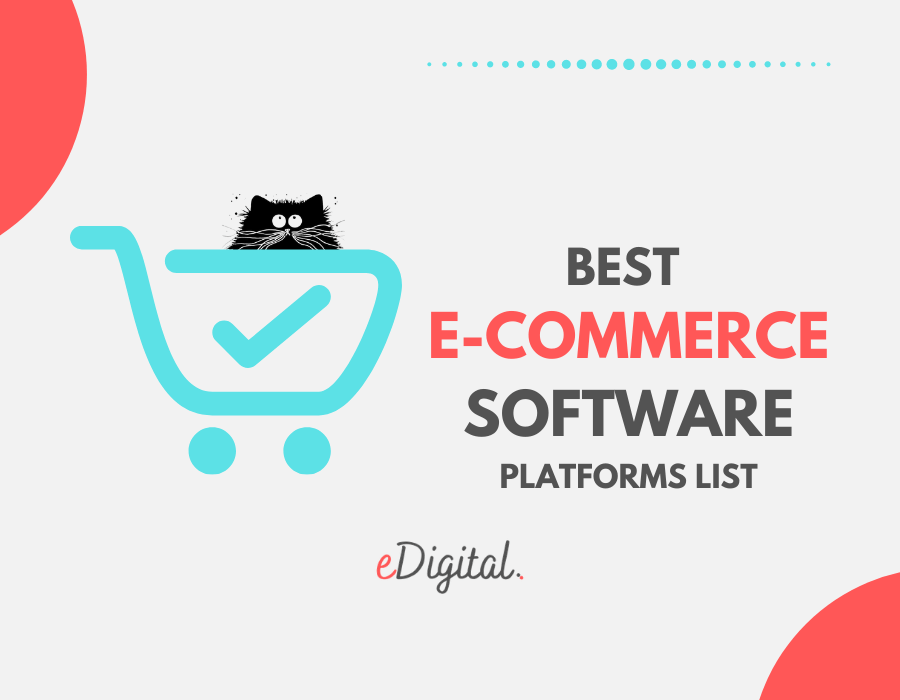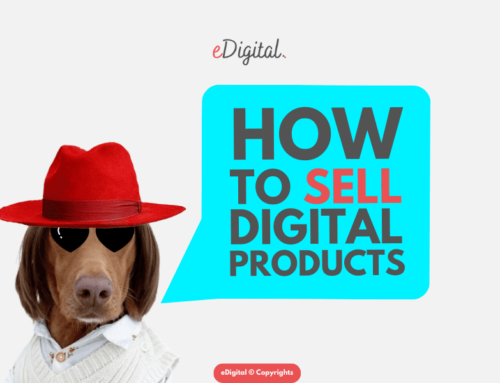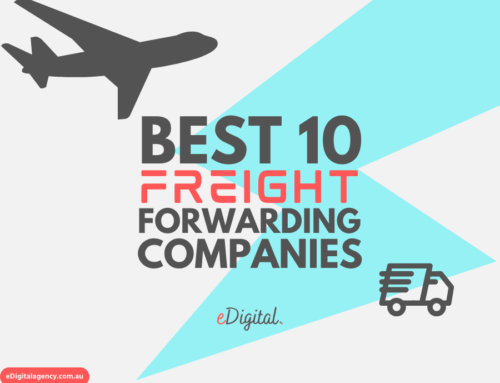THE BEST 10 E-COMMERCE SOFTWARE AND PLATFORMS IN 2024
Find the best 10 e-Commerce software and platforms in 2024. Make your website a powerful selling engine by using one of these companies offering e-commerce platforms. Find below the best list of the top 10 e-Commerce software companies offering solutions for online selling.
Brought to you by Mau, a Senior e-Commerce Specialist at eDigital.
You will enjoy > This year’s top 10 graphic design trends
THE BEST 10 E-COMMERCE SOFTWARE AND PLATFORMS IN 2024
HOW TO CHOOSE THE BEST E-COMMERCE SOFTWARE IN 2024
E-commerce has become an enormous industry that’s much simpler to get into than you might think.
There’s little risk involved when starting your e-commerce store (aka online business), and the cost of failure is minimal compared to brick-and-mortar stores.
In some cases, you do not have to stock inventory (dropshipping) if that’s part of your business model, you can try and experiment quicker and easier with an online store and apply lean methodologies until you find your successful products.
Once you’ve settled on your niche area you have to decide which e-commerce platform to set up your online store on.
Below are some important aspects to consider when selecting e-commerce software:
- Matches your customers’ needs. Have you figured out what your potential customers care about in the buying process? Do they need specific ways to browse and find the product they want? (by colour, size, material, gender, etc) Do they care about payment options, delivery options/times? You should have a list of all your customer buying expectations/requirements when choosing your e-commerce platform to ensure your new platform can manage all the key components to create an intuitive, easy and successful buying experience for your customers.
- Scalability. Choose a platform that will allow your business to scale and grow. Are you expecting 10, or 100 customers a month or 100.000 a month? This might affect the way you choose your e-commerce platform.
- Key Platform features. Does it offer the exact features you need to manage and update your products and inventory? How easy is it to customise those features to meet your needs?
- Returns. Check how the platform manages returns or the new “Keep it” option implemented by Amazon, Walmart and other companies that use artificial intelligence to decide whether it makes economic sense to process a return.
- Themes and templates. Look at the templates available, and try to find one that already matches what you want. Most platforms have a theme library you can browse. Are they free and easy to install? How easy is it to customise the template for key events: Valentine’s Day, Mother’s Day, Christmas, etc?
- Security. Think about security as well – are they a trusted option? Do they offer support if there is a security breach?
- SEO. What best SEO tools or SEO-free plugins can be used? Is it easy to set up canonical pages in case you have different pages for the same product? this is important for SEO.
- Longevity. Who are their current investors and how long have they been in the marketplace? Check their company info on Crunchbase.
- Support. Do they offer tools and education programs for you to better and fully utilise the software? Do they offer meetups and/or events to help customers? This can show the level of commitment they have towards their user base.
- Version upgrades. Is it easy to update to the latest version? do they offer support in case something goes wrong?
- Integrations. The more integrations, the better. Do they offer hooks via Zapier or other tools? Can your best CRM software or email marketing platform easily integrate with your online store platform? Check that! For example, Woocommerce can easily integrate with MailChimp. You may also want to check if it can easily be integrated with one of the best buy-now-pay-later platforms to ensure your customers have the option to pay in instalments.
- Do not blame the platform. Sometimes you do not sell because of the platform you have chosen but because of your buying methodology. Let customers decide what gets promoted on your online Shop. Many online store owners spend a bunch of time picking out products they like. If you want to be successful and rake in sales each day with eCommerce, you’ve got to detach yourself from the products. The key is to choose products other people are passionate about. Not you. If you choose products based on emotion alone, you’re almost certainly doomed to fail.
- Benchmark best platforms. Is there any online store you like? You can easily find out what platform they use with the WhatCMS tool on whatcms.org.
Popular today > This year’s top 10 social media marketing trends
Tip: If you are an artist, you better read our article on the best e-commerce websites made for artists
THE BEST 10 E-COMMERCE SOFTWARE AND PLATFORMS IN 2024
10. SHOPIFY ✅ MOST TRUSTED ✅

A Canadian e-commerce online store builder that has been in the business since 2004 and is used by over half a million e-commerce businesses. It’s simple to use, comes with more training materials than you could imagine, and has a wide-reaching support community. If you want a stylish all-rounder, Shopify is a great way for you to build your online store and enter the world of e-commerce. After a two-week trial period ends, you can select from a basic, standard, advanced, or plus package, giving you the ability to evolve your e-commerce store to match the growth of your business.
Key features:
- Over 1,400+ apps in their App Store.
- Offers 24/7 support via phone, live chat and email.
- Offers over 100 professional paid and free and responsive themes with the ability to directly edit the HTML and CSS
- Includes a complete blogging platform
- Offers creation of your domain name
- Supports about 70 different payment processors in multiple currencies
- Marketing and SEO optimised
- Supports Inventory Management
- Various online storage plans and Unlimited bandwidth
- Site Analytics
- Built-in and free available mobile eCommerce shopping cart features
- Easy to set up. Especially for non-techies and beginners
- The admin area is quite user-friendly and modern
- Offers free hosting which comes with your paid account
- Shopify appears to be quite fast
- Secure payments and sensitive data
- A good bank of add-ons is available (mostly paid) to allow you to add additional features.
Best suited for: Best suited for both beginners and professionals.
Notes:
- The default version allows the display of only three product attributes; size, colour and material.
- Monthly subscription fee and a processing fee for each transaction. The addition of other paid apps/add ons that involve monthly subscriptions will further escalate your costs.
- Check out the video below to learn more about Shopify…
Are your customers complaining? You can learn how to write the best customer service plan template and boost your customer satisfaction metrics.
Exclusive > The world’s top 25 sports athletes on Instagram
9. BIGCOMMERCE
BigCommerce is one of the leading eCommerce platforms with hundreds of thousands of clients. Favoured by companies large and small as it is completely scalable and has no need for coding. If you’re looking for a platform that allows you to keep 100% (sans tax) of each sale that you make then this provider will become a big friend of yours. The sacrifice you make for losing the transaction fee is that BigCommerce is not as friendly with market vendors as some of its peers are.
Key features:
- No technical knowledge is required as it comes packed with multiple built-in features.
- Supports many additional eCommerce features like gift cards, reviews & ratings, as well as basic marketing tools etc which come built-in.
- Requires to 3rd party add-ons as most of the required features are in-built in
- No transaction fee for Plus monthly paid subscriptions
- Responsive and mobile-friendly free and paid themes available with customizable CSS/HTML
- Full stock control over inventory with no need for third-party software
- Supports multiple built-in payment gateways in different currencies
- Great customer support. Solid 24/7 Support staff to deal with all complexities.
- Hosting comes with a monthly/annual plan.
- Comes with a host of in-built tools and supports promotions via different social channels.
- Supports marketing via AdWords integration, coupons etc
Best suited for: Best suited for midsize businesses or small businesses with a quick expansion rate.
Marketers are reading > The top 25 trending hashtags on TikTok
8. DRUPAL
With over 1.3 million members and providing the back-end framework for 2.3% of all websites across the globe, it’s no surprise that many e-commerce businesses use this open-source content management system. It has great functionality and a wealth of themes and templates so that you can get your e-commerce website looking and acting how you want it to. Drupal also has thousands of plugins, making customization a piece of cake. As an open-source CMS, Drupal is free for you to use and build your e-commerce business. However, this also means that you’ll have other costs to cover, such as hosting.
Just in > The best time to post on TikTok
Marketers are reading > The top 25 most-followed Australians on Youtube
7. JIMDO
Multi-Screen website development platform. Create your dream website in just a few clicks with Jimdo’s quick and easy website builder. Customise your design, connect your domain, and edit your website at any time with no coding required.
Not sure what to sell? The top 10 fastest-growing industries list
6. MAGENTO
This American-based platform comes armed with a client base that includes global fast-food brands (Burger King) noted soccer teams (Liverpool F.C.) and celebrated clothing companies (Pepe Jeans). Magento comes armed with just shy of 10,000 plugins, a raft of options for you to customize your site, and a resource library as large as Ayers Rock. There is a free option for this sleek platform. However, if you’re looking for a platform that gives you an enterprise-level service you’ll be looking at an annual fee.
Key features:
- A completely scalable system with support for huge inventory.
- Self-hosted, feature-rich and intensive platform completely customizable
- Free and paid customisable responsive themes optimised for mobiles and tablets
- Supports multiple payment gateways, multiple currency options, in-built order processing and detailed coupon management.
- Supports API for web services
- Built-in multilingual support
- Detailed Inventory management
- Many paid and free extensions are available
- Built-in SEO features
- In-built Content management system with unlimited product attributes and in-built marketing tools and newsletter management.
Magento is best suited for bigger stores with thousands of products and tons of traffic.
Notes:
- Not a game for beginners. Needs extensive technical knowledge to deal with the multiple files that come with Magento installation. Needs a great technical expert or a certified Magento Developer or agency. NetStarter is a good one in Australia.
- Will need premium hosting owing to the number of server resources it requires.
- It can run quite slowly if not properly optimised.
- Its premium plans are not cheap.
- More than 250.000 merchants use Magento.
Want to refresh your Linkedin cover photo? > The best Linkedin profile cover image ideas, examples and styles
✅ Marketers are using > The best bots and apps for free real Instagram followers
“Things are constantly changing. An e-commerce platform needs to be flexible and open. A solid API assures the ability to connect with other systems and plugins. I’d always choose a cloud-based platform that has plenty of available developers”
Bonny Morlak, CEO Tiltsta
5. PRESTASHOP
Create your online store with PrestaShop’s free shopping cart software. Build an e-commerce website and start selling online with hundreds of powerful features. You will need a web agency to build Prestashop for you.
Briefing a professional photographer? > The best creative photography brief template
Is your social media working? > Professional social media managers are using the best social media strategy template
Tip: If you are an artist, you better read our article on the best e-Commerce websites made for Artists
4. SQUARESPACE
Squarespace is one of the most valued online website e-commerce service companies hosting more than three million websites. Its offices are spread across its headquarters and offices in Dublin, Ireland; Portland, Oregon; and Los Angeles, California.
Find out > The top 25 most expensive art ever sold.
⚡️ Trending > The top 25 most popular hashtags on Instagram
3. WEEBLY
Based in San Francisco, Weebly is a drag-and-drop website builder and a basic e-commerce platform for small businesses. With Weebly, you can provide online visitors with the convenience of a fully integrated shopping cart and a secure checkout experience directly from your Weebly site. Weebly’s shopping cart software is set up automatically when you create your online store so you can start selling online immediately, no technical skills are needed. Key features:
- Inventory tracking. Manage a handful or hundreds of products. Track your inventory to manage your supply, show customers the number of items remaining to create urgency and boost buying behaviour (e.g. only 2 left!), and automatically update shoppers when items are out of stock if they attempt to purchase from your eCommerce website.
- Product search. Give shoppers a faster way to find exactly what they want. Highlight the most relevant products and let your customers filter the results by attributes like price, colour, etc. Filtered product search helps you maximize exposure across all of your inventory and create more buying opportunities.
- Sell anything. Flexible options for selling a wide range of products directly from your eCommerce website. Digital and downloadable items are automatically delivered to your customers via email with a secure one-time-use link. There are extensive options for physical products, one-of-a-kind handmade items, services and donations that can be completely customised to meet your needs.
Marketers are reading > This year’s top 10 graphic design trends
2. WIX
Israel’s Wix is another cloud-based platform that has great popularity in the e-commerce world, with the Tel Aviv-based company registering over 100 million users. While simplicity is a big selling point for Wix, integration is one of the most useful benefits. You can add Google Analytics and many other third-party tools to your e-commerce store without sacrificing the usability of your website. Many of Wix’s templates are available for free. However, you do have the option to upgrade your plan and add additional features as you see fit. A further benefit is that Wix recommends accounts based on the status of your business – i.e. they have an e-commerce (for small businesses) account and a combo (personal) account.
Key features:
- Crowned the leading global eCommerce Platform in 2017.
- Code-free & easy to use. Offers drag & drop site builder
- Hosts a collection of more than 500 fully customisable responsive and mobile-friendly templates.
- Powerful customer support: Help Center, Tutorials, Interactive Forum etc.
- Drag-and-drop store builder (no coding required)
- Photo Galleries
- Secured shopping cart and easy order tracking
- Global shipping and tax management
- Support for additional web apps and services
- Hosting included
Best suited for small businesses with a low budget who want an easy-to-build e-commerce solution.
Notes:
- Wix allows the display of only two product attributes; size and colour.
- Customisation could be cumbersome and confusing as you will have to deal with choosing from lots of options.
- Changes aren’t easily accessible
Join 5k+ subscribers and receive the best digital marketing tips!
1. WOOCOMMERCE
The world’s most popular and free eCommerce solution with more than 1.5 million stores using WordPress. WooCommerce is an open-sourced and free e-commerce plugin for WordPress and is estimated to run around 30% of e-commerce businesses worldwide. It’s quick, it’s simple, it comes with unlimited product categories, and it has a secure payment gateway. WordPress users will easily enjoy these features. WooCommerce is a free way of creating an e-commerce store. However, while this is brilliant for new companies, it does present problems if you have ambitions of growing your business, as it begins to slow down as you increase your site visitors.
Key features:
- Allows Multiple Product attributes
- Supports the selling of physical and digital products.
- Supports multiple payment processors via free and paid “add-ons“.
- Supports inventory control with flexible shipping settings
- Supports tax handling on sales, and automatic tax calculations
- A huge bank of free and paid extensions
- Secure, with frequent upgrades being released
- Responsive and mobile-friendly
- Search engine friendly
- Multiple performance tracking add-ons are available
- Actively supported and upgraded.
- Multiple ready-made themes are available. Free and Paid with in-built add-ons.
- Supports one-page checkout with user reviews and ratings.
- Great support is available from add-on developers and in public forums and other communities.
WooCommerce is best suited for small store owners with not much of a long-term cost involvement.
Notes:
- Not for beginners. Technical knowledge is required to add WooCommerce to your WordPress store
- More detailed technical expertise is required for the integration of ready-made or customised themes
- Although free, many of its extensions are paid.
- Only works for WordPress sites.
Trending today > How to do competitive analysis in marketing
E-COMMERCE TOOLS WORTH CHECKING
- CodeMentor.io Learn how to create an e-commerce website in Laravel 5.4
- OptimizePress The easy way to create landing pages, sales pages and membership portals inside WordPress.
- Social Rabbit plugin auto-promotes your WordPress e-commerce website in social networks.
THE BEST FRAMEWORKS TO BUILD AN E-COMMERCE SITE FROM SCRATCH
- Oscar is an open-source e-commerce framework for Django.
- Flask Pocoo Popular e-commerce framework if you want to build from scratch.
- Getcandy.io A developer-friendly e-
commerce engine. Fast open-source API + Admin Hub are free to use on any project; no restrictions to storefront design/mechanics; not tied into closed-source software (e.g. Shopify, Big Commerce, etc). - Konakart is a Java-based enterprise eCommerce shopping cart application that provides an extensive set of features to enable retailers to successfully sell their products over the internet. KonaKart is a Java / JSP / XML-based solution with comprehensive use of Java, SOAP, RMI, JSON and JavaScript APIs that allow you to quickly integrate eCommerce functionality into your existing systems. The customisable parts of KonaKart are Open Source and available under the GNU LGPL.
- Laravel is the PHP framework for web artisans Laravel revolutionizes how you build the web. Instant PHP Platforms On Linode, DigitalOcean, and more. Push to deploy, PHP 7.2, HHVM, queues, and all you need to launch and deploy amazing Laravel applications. Launch your application in minutes!
- Vanilo.io is an open-source E-commerce Platform for Laravel 5+
- Opencart is a free shopping cart system. OpenCart is an open-source PHP-based online e-
commerce solution. It requires add-ons (some free, some paid) to support advanced features. OpenCart has good support for extensions via its community of developers. - Ruby on Rails is a web application framework to create database
-backed web applications according to the Model-View-Controller (MVC) pattern. It includes the ability to create e-commerce platforms and websites. Some already-built e-commerce platforms using Ruby on Rails include: - Solidus.io is an open-source, e-commerce platform for high-volume, complex storefronts. Built with Ruby on Rails, this mountable engine provides a scalable, stable, and highly customisable platform for online commerce.
- Spree Commerce Spree is a complete open-source e-commerce solution built with Ruby on Rails that powers more than 45000 stores around the globe
- Saleor is an open-source storefront platform for perfectionists. Written in Python, best served as a bespoke, high-performance e-commerce solution. Human clone or download. Great for developers. Better architecture means productive developers. Clear architecture.
- Shuup is a high-performance commerce for running your complex e-commerce operations, end-to-end. Perfect for one-shop retailers to multi-location superstores. Increase online conversions with Shuup.
Tip: If you are an artist, you better read our article on the best eCommerce websites for Artists
TOP TIPS AFTER YOU’VE CHOSEN YOUR E-COMMERCE PLATFORM
- Do not rely only on free SEO traffic. SEO traffic is very important. Our clients invest heavily in our SEO services in Sydney to get them more free traffic. Unless you’re a massive site like Amazon or you publish hundreds of articles per week, you should not become dependent on SEO traffic only. The best way to get the highest quality traffic to your site (and FAST), is to keep engaging with your current customers. Most of our clients find traffic from social media sites such as Facebook, Instagram or Linkedin is minimal. Google Ads work quite well as you can get traffic that converts starting with a low budget.
- Email marketing automation. Most of your sales won’t come from first-time customers. They come from repeat customers. And the best way to get repeat customers is with email marketing. After your customers’ purchase, you have their email addresses, and so you use simple emails to get them back in your stores to buy, Buy and BUY again!
- You may also want to review some of the best buy-now-pay-later companies to boost your online sales while ensuring your customers have the option to pay in instalments.
THINKING OF SELLING TO THE CHINESE MARKET?
If you are a new entrepreneur thinking of testing the Chinese market, a great strategy is to form partnerships with already well-positioned e-commerce websites where you can list your products.
Some of the most popular online stores in China are:
- Tmall.com (tao bao)
- NetEase (163)
- Kaola.com
- JD.com
- VIP.com
PRINT-ON-DEMAND PLATFORMS
- Printful
- Lulu Xpress
- Gooten
- N.A.BLD
- Printify
- Print On Demand Tips
Marketers who read this article are also reading: The best video editing software
CONCLUSION
eCommerce is a booming industry that offers you endless potential to create your own business. Once you’ve settled on your niche area you have a wealth of options available for the platform to build your website on. The above list will help you review some e-commerce platform options and hopefully open the door to your e-commerce journey.
You may also want to review some of the best buy-now-pay-later companies to boost your online sales while ensuring your customers have the option to pay in instalments.
eDigital can help you conceptualise, plan, develop, run and optimise successful digital marketing campaigns that generate leads and sales for your brand.
Our digital marketing services include:
- Strategic planning for social media and other digital marketing channels.
- Online advertising management and optimisation: Google Ads Search, Display, Re-marketing and social media advertising.
- Training: social media marketing training and digital marketing training.
- SEO strategy and execution. Including content development:articles, stories, eye-catching and SEO-optimised visuals.
- Celebrity and influencer marketing campaign strategy.
- Brand development. Logo creation, brand personality development and design of marketing materials.
- Consumer contests/competitions/giveaways.
- Email marketing. Dip sequence design and deployment.
- Conversion rate optimisation. It is also called “path to purchase” optimisation.
Contact us today and start boosting your leads and sales.
Hundreds of marketers have supported us with their generous donations. Please donate today! or join 5k+ marketers receiving our e-newsletter.
Final note: Want to reduce customer acquisition costs and dependency on paid media? eDigital‘s marketing strategy training will unmercifully review your marketing, help you build a marketing engine with channels and assets you own, stir your team’s thinking, bring new ideas for new conversion paths and boost customer lifetime value.
THE WORLD’S BEST E-COMMERCE SOFTWARE AND PLATFORMS IN 2024
Mau is one of the most popular marketing consultants offering the best marketing strategy training and the best social media training. Top marketers use Mau’s popular Digital Marketing Plan and Social Media Plan templates
Book Mau for your next training day or join 5k+ marketers receiving Mau‘s e-newsletter





